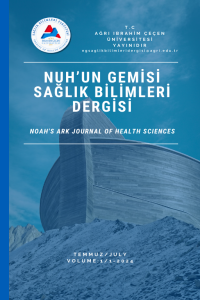Öz
This research was conducted to examine the effect of owning a pet on maternal attachment in the postpartum period. The research is a cross-sectional research conducted using the online survey method between October 2022 and March 2023. 49 pet-owning and 35 non-pet-owning mothers with babies aged between 0-6 months participated in the study (n: 86). Socio-demographic characteristics introduction form and maternal attachment scale were used to collect research data. The data of the study were analyzed using SPSS (Statistical Package for Social Sciences) for Windows 25.0 program. It was determined that 75.5% of mothers who own pets own a cat, and 6.1% say that owning a pet affects their idea of pregnancy. The mean maternal attachment scale score of mothers who own pets was 97.26±6.59, and the mean maternal attachment scale score of mothers who did not own pets was 97.82±4.57, and it was determined that there was no statistically significant difference. As a result of this study, it was determined that there was no difference in the level of maternal attachment between mothers who owned pets and mothers who did not own pets. It is thought that this may be due to the insufficient number of research samples and mothers' concerns about increasing the burden of baby care.
Anahtar Kelimeler
Kaynakça
- Adhikari, A., Jacob, N.K., Hansen, A.R., Wei, Y., Snook, K., Liu, F., Zhang, J. (2019). Pet ownership and the risk of dying from lung cancer, findings from an 18 year follow-up of a US national cohort. Environ. Res. 173, 379–386. https://doi.org/10.1016/j.envres.2019.01.037
- Arpacıoğlu, S. (2021). Evcil hayvan sahibi olmanın, psikolojik sağlamlık ve bağlanma ile ilişkisinin incelenmesi. Türk Psikiyatri Dergisi, 32(2), 22 - 22.
- Beetz, A., Uvnäs-Moberg, K., Julius, H., & Kotrschal, K. (2012). Psychosocial and psychophysiological effects of human-animal interactions: the possible role of oxytocin. Frontiers in Psychology, 3, 234. https://doi.org/10.3389/fpsyg.2012.00234
- Bowlby J (1988). Developmental Psychiatry Comes Of Age. Am J Psychiatry. Jan;145(1):110.
- Dinç, G., Doğanay, M., & İzgür, M. (2015). Pet hayvanlardan insanlara bulaşan önemli bakteriyel enfeksiyonlar. Türk Hijyen ve Deneysel Biyoloji Dergisi, 72(2), 163-174. https://doi.org/10.5505/TurkHijyen.2015.81557
- Güngör, N. D., Gürbüz, T., Bozkurt, S., Dokuzeylül, B., Erman, O. R., & Cengiz, F. (2021). Evaluation of toxoplasmosis risk on anxiety and perception of cat owner pregnant women. Journal of Experimental and Clinical Medicine, 38(2), 154-158. https://doi.org/10.52142/omujecm.38.2.18
- Inano, H., Kameya, M., Sasano, K., Matsumura, K., Tsuchida, A., Hamazaki, K., ... & Hasegawa, T. (2021). Factors influencing exclusive breastfeeding rates until 6 months postpartum: the Japan Environment and Children’s Study. Scientific Reports, 11(1), 1-11. https://doi.org/10.1038/s41598-021-85900-4
- Kavlak, O., & Şirin, A. (2009). Maternal bağlanma ölçeği’nin türk toplumuna uyarlanması. Uluslararası İnsan Bilimleri Dergisi, 6(1).
- Kohlhoff, J., Eapen, V., Dadds, M., Khan, F., Silove, D., & Barnett, B. (2017). Oxytocin in the postnatal period: Associations with attachment and maternal caregiving. Comprehensive Psychiatry, 76, 56-68. https://doi.org/10.1016/j.comppsych.2017.03.010
Öz
Bu araştırma evcil hayvan sahibi olmanın postpartum dönem maternal bağlanmaya etkisini incelemek amacıyla gerçekleştirilmiştir. Araştırma Ekim 2022–Mart 2023 tarihleri arasında online anket yöntemi ile gerçekleştirilmiş kesitsel türde bir araştırmadır. Araştırmaya 0-6 ay arasında bebeğe sahip 49 evcil hayvan sahibi olan, 35 evcil hayvan sahibi olmayan anne katılmıştır (n:86). Araştırma verilerinin toplanmasında sosyo-demografik özellikler tanıtım formu ve maternal bağlanma ölçeği kullanılmıştır. Araştırmanın verileri SPSS (Statistical Package for Social Sciences) for Windows 25.0 programı kullanılarak analiz edilmiştir. Evcil hayvan sahibi olan annelerin %75,5’inin kediye sahip olduğu, %6,1’inin evcil hayvan sahibi olmanın gebelik düşüncesini etkilediği saptanmıştır. Evcil hayvan sahibi olan annelerin maternal bağlanma ölçek puan ortalaması 97,26±6,59, evcil hayvan sahibi olmayan annelerin maternal bağlanma ölçek puan ortalaması 97,82±4,57 olarak saptanmış ve istatistiksel açıdan anlamlı bir fark olmadığı belirlenmiştir. Bu çalışmanın sonucunda evcil hayvan sahibi olan annelerle evcil hayvan sahibi olmayan anneler arasında maternal bağlanma düzeyi açısından fark olmadığı saptanmıştır. Bu durumun araştırma örneklem sayısının yetersiz olması, annelerin bebek bakımı konusundaki yük artışı kaygısı nedeniyle olabileceği düşünülmektedir.
Anahtar Kelimeler
Etik Beyan
Araştırmanın gerçekleştirilebilmesi için bir üniversitenin bilimsel araştırmalar etik kurulundan onay alınmıştır (10.10.2022 tarih ve E.52682 sayılı yazı).
Destekleyen Kurum
Herhangi bir destekleyen kurum ya da kuruluş bulunmamaktadır.
Teşekkür
Çalışmaya katılan annelere teşekkür ederiz.
Kaynakça
- Adhikari, A., Jacob, N.K., Hansen, A.R., Wei, Y., Snook, K., Liu, F., Zhang, J. (2019). Pet ownership and the risk of dying from lung cancer, findings from an 18 year follow-up of a US national cohort. Environ. Res. 173, 379–386. https://doi.org/10.1016/j.envres.2019.01.037
- Arpacıoğlu, S. (2021). Evcil hayvan sahibi olmanın, psikolojik sağlamlık ve bağlanma ile ilişkisinin incelenmesi. Türk Psikiyatri Dergisi, 32(2), 22 - 22.
- Beetz, A., Uvnäs-Moberg, K., Julius, H., & Kotrschal, K. (2012). Psychosocial and psychophysiological effects of human-animal interactions: the possible role of oxytocin. Frontiers in Psychology, 3, 234. https://doi.org/10.3389/fpsyg.2012.00234
- Bowlby J (1988). Developmental Psychiatry Comes Of Age. Am J Psychiatry. Jan;145(1):110.
- Dinç, G., Doğanay, M., & İzgür, M. (2015). Pet hayvanlardan insanlara bulaşan önemli bakteriyel enfeksiyonlar. Türk Hijyen ve Deneysel Biyoloji Dergisi, 72(2), 163-174. https://doi.org/10.5505/TurkHijyen.2015.81557
- Güngör, N. D., Gürbüz, T., Bozkurt, S., Dokuzeylül, B., Erman, O. R., & Cengiz, F. (2021). Evaluation of toxoplasmosis risk on anxiety and perception of cat owner pregnant women. Journal of Experimental and Clinical Medicine, 38(2), 154-158. https://doi.org/10.52142/omujecm.38.2.18
- Inano, H., Kameya, M., Sasano, K., Matsumura, K., Tsuchida, A., Hamazaki, K., ... & Hasegawa, T. (2021). Factors influencing exclusive breastfeeding rates until 6 months postpartum: the Japan Environment and Children’s Study. Scientific Reports, 11(1), 1-11. https://doi.org/10.1038/s41598-021-85900-4
- Kavlak, O., & Şirin, A. (2009). Maternal bağlanma ölçeği’nin türk toplumuna uyarlanması. Uluslararası İnsan Bilimleri Dergisi, 6(1).
- Kohlhoff, J., Eapen, V., Dadds, M., Khan, F., Silove, D., & Barnett, B. (2017). Oxytocin in the postnatal period: Associations with attachment and maternal caregiving. Comprehensive Psychiatry, 76, 56-68. https://doi.org/10.1016/j.comppsych.2017.03.010
Ayrıntılar
| Birincil Dil | Türkçe |
|---|---|
| Konular | Doğumun Psikososyal Yönleri ve Perinatal Ruh Sağlığı |
| Bölüm | Araştırma Makalesi |
| Yazarlar | |
| Yayımlanma Tarihi | 30 Temmuz 2024 |
| Gönderilme Tarihi | 14 Mayıs 2024 |
| Kabul Tarihi | 8 Temmuz 2024 |
| Yayımlandığı Sayı | Yıl 2024 Cilt: 1 Sayı: 1 |

